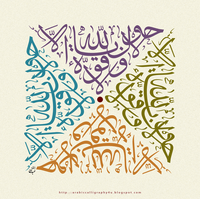Hawqala

The Ḥawqala (Arabic: حَوْقَلَة) is an Arabic word referring to the statement lā ḥawla wa-lā quwwata ʾillā bi-llāhi (Template:Rtl-lang) which is usually translated as "There is no power nor strength except by Allah." A longer version is lā ḥawla wa-lā quwwata ʾillā bi-llāhi l-ʿalīyi l-aẓīmi (Template:Rtl-lang), meaning "There is no power nor strength except in Allah, the Lofty, the Great". This expression is mentioned by a Muslim whenever seized by a calamity or in a situation beyond their control. The word Ḥawqala is a portmanteau (or naḥt) of the words ḥawla and quwwata.[1]
The English translation does not completely convey the full meaning of the phrase.[citation needed] For example, translating the word ḥawla as "power" is an oversimplification. The Hans Wehr Dictionary of Modern Written Arabic shows the linguistic verb root for ḥawla as ḥ-w-l, and it depicts all manner of change, transformation and motion.
It is used in other phrases like:
- Subhan'Allahi wal hamdulillaahi wa laa ilaaha ilallaahu wAllahu Akbar wa laa hawla wa laa quwwata illaa billaahil 'aleeul azeem.[clarification needed]
- Laa ilaaha illal laahu wahdahoo laa sharikalahoo lahul mulku wa lahul hamdu wa huwa 'alaa kulli shai'in qadeer. Subhan'Allahi wal hamdulillaahi wa laa ilaaha ilallaahu wAllahu Akbar wa laa hawla wa laa quwwata illaa billaahil 'aleeul azeem.[clarification needed]
See also
References
- ^ Piamenta, Moshe (1979). Islam in Everyday Arabic Speech. BRILL. p. 155. ISBN 90-04-05967-9.
